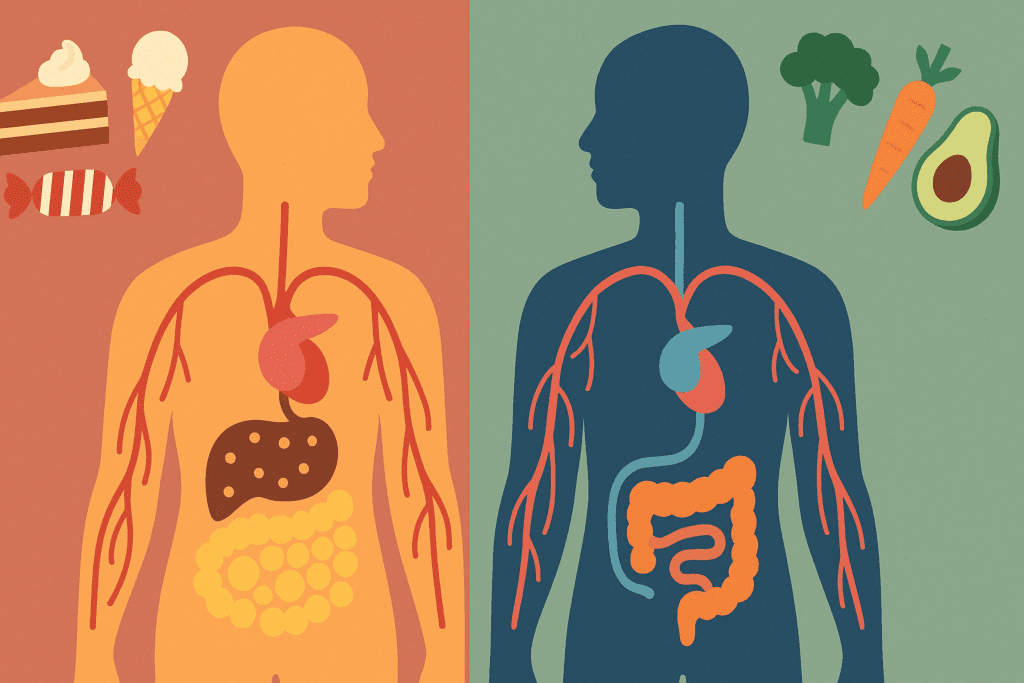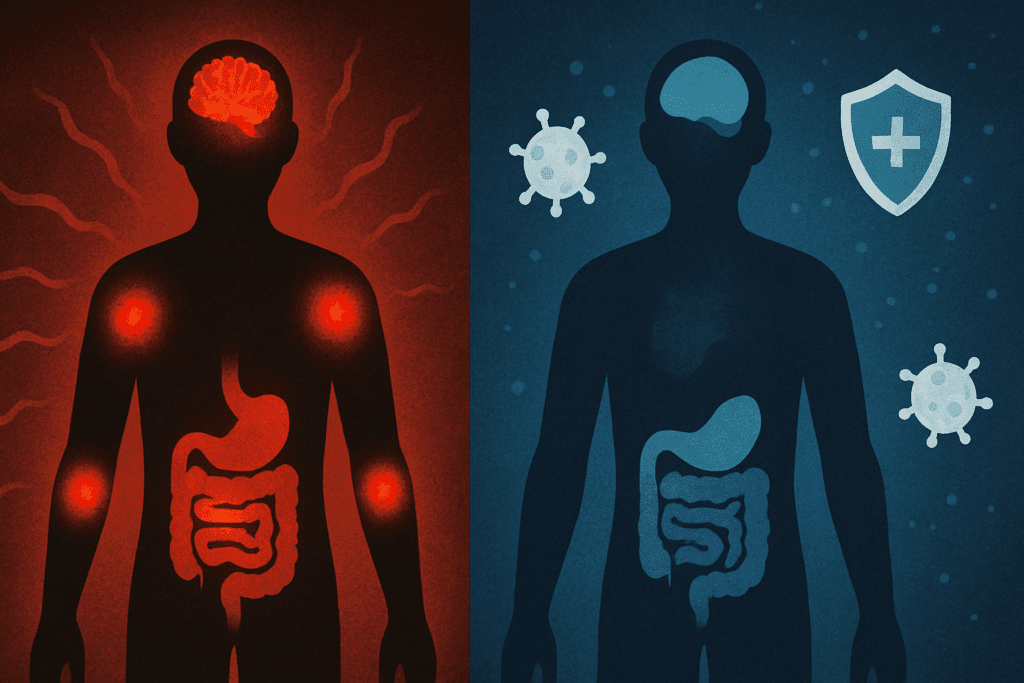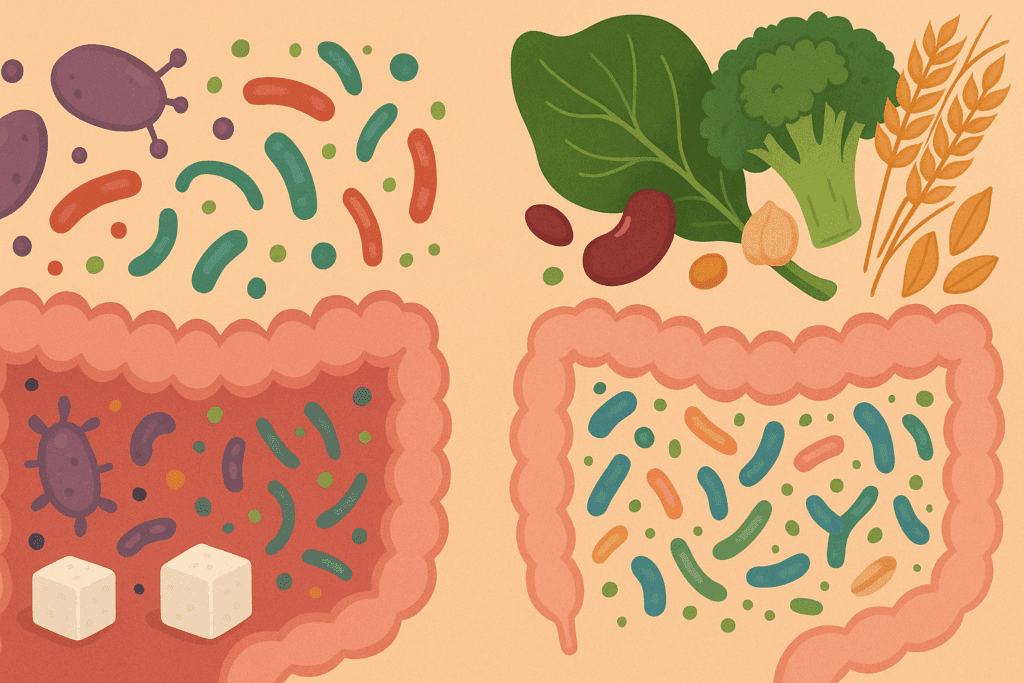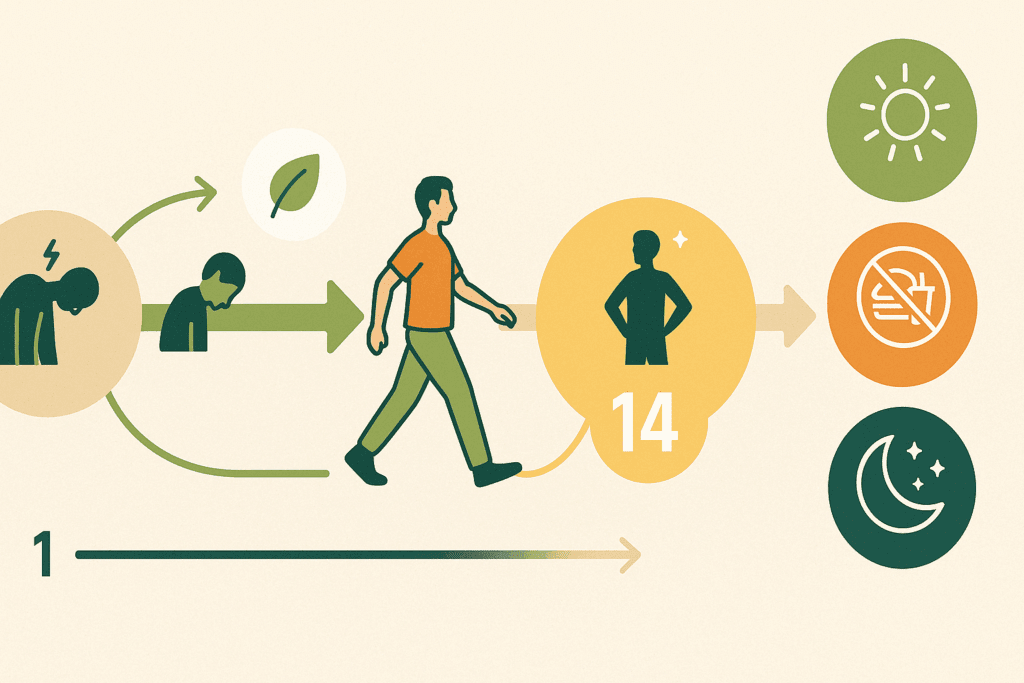The Rising Need to Break Free from Sugar Dependence
In today’s food landscape, added sugar hides in plain sight. It shows up in sauces, cereals, granola bars, beverages, and even items labeled as “healthy.” For many people, daily sugar intake far exceeds recommended levels—often without them even realizing it. This chronic overconsumption doesn’t just add extra calories; it disrupts metabolism, increases fat storage, affects mental clarity, and impairs immune function. That’s why the concept of going no sugar for 2 weeks has gained traction among health-conscious individuals looking for a reset.
Eliminating added sugar for just fourteen days may sound simple, but it challenges long-held habits and exposes just how deeply sugar is ingrained in the modern diet. Yet, those who take on the challenge often find that the benefits go well beyond cutting a few sweets. Many report improved energy, better sleep, enhanced focus, and perhaps most notably, visible results on the scale. The growing popularity of the no sugar for 2 weeks weight loss trend isn’t just hype—it reflects real physiological changes that begin as soon as sugar stops entering the bloodstream.
By committing to a temporary sugar detox, you give your body a chance to recalibrate. Hormones begin to rebalance, cravings diminish, and inflammation starts to subside. The shift is not just physical; it’s psychological. Food choices become more mindful, taste buds become more sensitive to natural flavors, and people begin to realize they’re no longer at the mercy of their sweet tooth. This article explores what happens when you quit sugar for two weeks and how the transformation supports not only weight loss but long-term wellness.
You may also like: Why Am I Craving Sweets All of a Sudden? Expert-Backed Reasons and How to Stop Sugar Cravings Naturally

Sugar and Your Metabolism: What Changes When You Quit?
Sugar directly influences the body’s insulin response, a key mechanism in metabolic health and weight regulation. When you eat foods high in added sugar, blood glucose rises sharply. In response, the pancreas releases insulin to shuttle glucose into cells for energy or storage. However, with consistent sugar consumption, the body may develop insulin resistance—a condition in which cells stop responding properly to insulin. This results in higher circulating glucose, increased fat storage (especially around the midsection), and higher risk of developing type 2 diabetes.
By choosing to go no sugar for 2 weeks, you’re disrupting this negative feedback loop. Without constant glucose spikes, your insulin levels begin to stabilize. This allows your body to switch more efficiently between energy sources, eventually tapping into stored fat for fuel—a critical component of healthy weight loss. This shift, often described as enhanced metabolic flexibility, is one reason why the no sugar for 2 weeks weight loss method works so effectively for many individuals.
Beyond insulin, sugar impacts leptin and ghrelin—two hormones that regulate hunger and satiety. When sugar intake is high, these hormones often misfire, leading to increased appetite and overeating. Removing sugar helps reset these signals. As a result, people frequently report feeling full on less food, experiencing fewer cravings, and eating in a more intuitive and balanced way. All of this contributes to a sustainable reduction in calorie intake, even without the need for counting or restriction.

The Psychological Side of Quitting Sugar
Reducing sugar intake doesn’t just affect your body—it significantly impacts your brain. Sugar stimulates the release of dopamine, the neurotransmitter responsible for feelings of reward and pleasure. Over time, this repeated activation can lead to a pattern of dependency, not unlike addiction. This is why sugary foods are often craved during times of stress, boredom, or emotional distress. They temporarily soothe but eventually worsen underlying imbalance.
The first few days of a no sugar for 2 weeks plan can be surprisingly difficult. Many people experience withdrawal symptoms: irritability, fatigue, anxiety, and even headaches. These symptoms reflect the brain recalibrating its reward circuits after being overstimulated by sugar. However, this discomfort is usually short-lived. Most participants report that by day five or six, cravings begin to diminish dramatically, and emotional eating tendencies start to fade.
By the end of two weeks, the brain’s dopamine pathways begin to normalize. This leads to improved focus, fewer mood swings, and greater emotional resilience. More importantly, individuals develop a deeper awareness of their relationship with food. They begin to eat with intention rather than impulse. The experience fosters a sense of empowerment, which becomes a key motivator for continuing the journey toward healthier, long-term habits.

Sugar, Inflammation, and Immune Function
Chronic low-grade inflammation is a major driver of disease—and sugar is a powerful pro-inflammatory agent. Excess sugar increases the production of pro-inflammatory cytokines and oxidative stress within the body. Over time, this can contribute to a wide array of health problems, including cardiovascular disease, metabolic syndrome, autoimmune disorders, and even cognitive decline.
One of the lesser-known benefits of eliminating sugar is the rapid reduction in inflammation markers. When people go no sugar for 2 weeks, their bodies respond quickly. Bloating often disappears, joint pain diminishes, and skin conditions such as acne or eczema may begin to improve. These visible and tangible results are a reflection of internal changes that have real medical significance.
The immune system also benefits from reduced sugar intake. High blood sugar impairs white blood cell activity and weakens the body’s ability to fight off infections. In contrast, a lower-sugar diet strengthens immune function, improving the body’s defenses against pathogens. For anyone prone to frequent colds, sinus infections, or digestive issues, going sugar-free for two weeks can provide a noticeable immune boost.

The Gut Microbiome’s Response to Sugar Elimination
The human gut is home to trillions of microorganisms that play an essential role in digestion, immunity, mood, and even weight regulation. This microbial ecosystem thrives on fiber, polyphenols, and resistant starches—not sugar. In fact, diets high in sugar tend to support the growth of harmful bacteria and yeast, including Candida albicans, while suppressing beneficial strains like Lactobacillus and Bifidobacterium.
When you remove sugar for two weeks, you begin to starve the “bad” microbes and give the helpful ones a chance to flourish. As a result, people often experience less gas, bloating, and digestive discomfort. Inflammation in the gut lining decreases, improving nutrient absorption and gut barrier integrity. This change isn’t just beneficial for digestion—it also supports mental health via the gut-brain axis.
Interestingly, many who adopt a no sugar for 2 weeks approach also notice improved mood, better sleep, and reduced brain fog. These benefits stem from both hormonal regulation and the rebalancing of the gut microbiome. A healthy gut is a cornerstone of overall well-being, and cutting sugar is one of the most effective ways to nurture it.

Stabilized Energy and Improved Sleep Quality
Contrary to popular belief, sugar does not provide sustainable energy. While it does cause a brief spike in blood glucose and alertness, that burst is typically followed by a crash. This drop in energy can lead to feelings of lethargy, poor concentration, and the familiar mid-afternoon slump that sends people reaching for coffee or candy.
By going no sugar for 2 weeks, individuals often experience a significant shift in how their body manages energy. Without the high and low fluctuations of blood glucose, energy levels remain steadier throughout the day. This stability supports consistent productivity, mental clarity, and a reduced need for caffeine or energy drinks.
Sleep quality also improves. Sugar, especially when consumed in the evening, can interfere with the production of melatonin—the hormone that regulates circadian rhythms. It can also raise cortisol levels, leading to restlessness or nighttime awakenings. Once sugar is eliminated, people frequently report falling asleep faster, staying asleep longer, and waking up feeling more refreshed.

Realistic Weight Loss in Two Weeks: What to Expect
Weight loss is one of the most commonly cited motivations for cutting sugar, and for good reason. The body responds quickly when it no longer has to process excess glucose and insulin. The first few pounds lost on a no sugar for 2 weeks weight loss plan may be water weight, as glycogen stores (which retain water) are depleted. But the benefits don’t end there.
As metabolism improves, fat burning increases—especially if sugar is replaced with whole, unprocessed foods. People often find themselves eating less overall, not because of strict restriction, but because they feel more satisfied. This natural reduction in calorie intake, paired with hormonal rebalancing, creates a favorable environment for fat loss.
That said, results vary based on starting weight, lifestyle factors, and dietary choices. Some may lose several pounds in two weeks, while others see smaller shifts. But even modest progress can be profoundly motivating. More importantly, the psychological wins—freedom from cravings, improved body awareness, and the confidence that comes from sticking to a goal—lay the groundwork for lasting success.

Long-Term Benefits and Next Steps After the Two-Week Reset
After successfully completing a sugar-free period, many people wonder, “What now?” The good news is that the benefits don’t have to stop at two weeks. In fact, the greatest transformations often begin during this window but continue evolving in the weeks and months that follow. Taste buds adjust, priorities shift, and sugar cravings become far easier to manage.
This reset offers a springboard into a more sustainable lifestyle. Rather than returning to old habits, many people adopt a new baseline—one where sugar is reserved for special occasions rather than daily consumption. Others choose to maintain a low-sugar diet indefinitely, having realized how much better they feel without it.
Reintroducing foods thoughtfully is key. Whole fruits, dark chocolate, or homemade treats with natural sweeteners like dates or monk fruit can be enjoyed mindfully. The idea isn’t necessarily to avoid sweetness forever, but to build a relationship with it that supports rather than undermines your health goals. This mindful approach not only helps preserve the weight loss achieved during the no sugar for 2 weeks weight loss phase—it also supports longevity and vitality for years to come.
Frequently Asked Questions: No Sugar for 2 Weeks and Its Impact on Weight and Wellness
1. What are some unexpected benefits people report after going no sugar for 2 weeks?
Beyond the more obvious outcomes like weight loss and reduced cravings, many people are surprised to find improvements in their skin, sinuses, and even joint mobility. Several individuals report fewer allergy-like symptoms, such as nasal congestion or headaches, which may be related to a drop in systemic inflammation. Others notice enhanced taste sensitivity, making naturally sweet foods like fruit much more satisfying. These benefits often emerge quietly during the no sugar for 2 weeks process and become more noticeable as the body adjusts. While not everyone experiences all these shifts, they reflect how interconnected sugar is with subtle physiological processes.
2. Can going no sugar for 2 weeks affect your social life or relationships?
Yes, though not in the way people might expect. Many individuals find that participating in the no sugar for 2 weeks challenge invites interesting conversations with family, friends, or coworkers, leading to shared goals and mutual support. On the flip side, social outings centered around desserts or drinks may initially feel more complicated. Learning to communicate boundaries without feeling pressured can be an empowering outcome. Some participants even inspire others to join them, turning a solo health effort into a communal one. Ultimately, this shift can enhance your sense of control in social settings and build more conscious food dynamics in relationships.
3. What are some lesser-known challenges people face during the no sugar for 2 weeks weight loss journey?
While sugar cravings and mood fluctuations are well known, one of the lesser-discussed obstacles is the feeling of emotional vulnerability. Sugar often masks stress, loneliness, or fatigue, so when it’s removed, those emotions can surface more clearly. Additionally, navigating the grocery store or meal planning can be unexpectedly overwhelming at first, especially when label reading becomes essential. For people with a history of emotional eating, this shift may require added support. Recognizing these internal changes early on allows participants to approach the no sugar for 2 weeks weight loss challenge with more self-compassion and realistic expectations.
4. How does cutting sugar for two weeks influence mental performance or creativity?
Several anecdotal reports and emerging studies suggest that reduced sugar intake can enhance focus, memory, and problem-solving abilities. The brain benefits from stabilized blood sugar, which prevents the energy crashes that often disrupt cognitive flow. During the no sugar for 2 weeks window, many professionals and creatives report sharper thinking and fewer distractions. While scientific research on sugar and creativity is still developing, it’s clear that cognitive clarity improves when sugar is no longer fueling erratic energy cycles. For writers, students, and entrepreneurs, this clarity can be one of the most motivating outcomes of the no sugar experience.
5. Is it possible to overcompensate with other foods when going no sugar for 2 weeks?
Absolutely—and this is something many people don’t anticipate. In an effort to avoid sugar, some individuals may gravitate toward refined carbs or calorie-dense alternatives like dried fruits, nut butters, or gluten-free snacks that still have high glycemic impact. This can slow or stall the no sugar for 2 weeks weight loss results, even if technically “sugar” is avoided. It’s important to replace sugar not just with low-sugar items, but with nutrient-dense, whole foods that actually stabilize blood sugar. A successful approach is not just about subtraction—but about thoughtful, balanced additions that support your overall health goals.
6. What happens to your emotional relationship with food during and after this two-week break from sugar?
One of the most profound yet underappreciated transformations occurs on the emotional level. The no sugar for 2 weeks period functions as a psychological detox just as much as a nutritional one. People begin to notice patterns in their eating—like snacking out of boredom or stress—that they previously overlooked. With sugar out of the equation, emotional regulation no longer hinges on sweet rewards, and this opens the door to deeper emotional awareness. After the two weeks, many individuals find themselves making more intentional food choices and feeling less controlled by impulse. This shift is key to sustaining results well beyond the initial challenge.
7. How does the body respond hormonally to a two-week sugar elimination?
Beyond insulin, which receives the most attention, several other hormones shift during a no sugar reset. Ghrelin (the hunger hormone) and leptin (the satiety hormone) begin to realign, improving hunger cues and making it easier to recognize fullness. Cortisol, the stress hormone, may also normalize over time, especially if sugar had been contributing to spikes in adrenaline or nighttime restlessness. These subtle shifts contribute meaningfully to the success of the no sugar for 2 weeks weight loss effort. Over time, this hormonal recalibration supports not only fat loss but also improved mood, better sleep, and greater metabolic efficiency.
8. Are there particular types of exercise that pair well with the no sugar for 2 weeks weight loss approach?
Yes, and the best approach may depend on your current fitness level and energy adaptation. In the early days of sugar elimination, light to moderate activity such as walking, yoga, or swimming may feel more sustainable, especially if your body is adjusting to lower blood glucose availability. As your metabolism begins to rely more on stored fat for energy, incorporating resistance training or interval workouts can accelerate fat burning. Importantly, avoiding overexertion early on ensures that your body doesn’t turn to muscle breakdown for energy. Pairing fitness with mindful recovery makes the no sugar for 2 weeks experience both more effective and more enjoyable.
9. How can you maintain progress after the no sugar for 2 weeks phase ends?
Transitioning out of a sugar-free period is just as important as the detox itself. Many people find success by slowly reintroducing natural sweeteners like fruit or raw honey in small, mindful amounts while continuing to avoid ultra-processed foods. Creating new rituals around meals—like enjoying herbal teas, baking with almond flour, or learning savory snack alternatives—helps reinforce the habits formed during the challenge. The no sugar for 2 weeks weight loss experience becomes a sustainable lifestyle shift when followed by conscious maintenance rather than an abrupt return to old habits. Continuing to track how certain foods make you feel can act as a personal compass for what to keep and what to leave behind.
10. Can this two-week challenge influence long-term risk factors for disease?
Surprisingly, yes—especially when used as a springboard into a healthier lifestyle. While two weeks is a short window, the reductions in insulin resistance, systemic inflammation, and blood pressure that often begin during this period can influence disease trajectory over time. Many people who undergo a no sugar for 2 weeks transformation use it to launch broader changes like adopting a Mediterranean-style diet or plant-forward eating. These shifts can reduce the long-term risk of conditions like heart disease, diabetes, and cognitive decline. Even more promising is the psychological empowerment that follows—proving to yourself that change is possible makes future health decisions easier to make and stick to.
Conclusion: A Two-Week Break from Sugar That Could Change Everything
Taking a break from sugar may sound simple, but its impact can be surprisingly profound. By committing to a no sugar for 2 weeks journey, you give your body the chance to reset on multiple levels—from hormones and digestion to inflammation and mental clarity. What begins as a short-term challenge often becomes a springboard for long-term change.
Those who embark on the no sugar for 2 weeks weight loss path frequently discover more than just a slimmer waistline. They gain energy, confidence, freedom from cravings, and a renewed sense of control over their health. These changes are real, measurable, and empowering.
In the end, the most important lesson may be this: health is not just about what you subtract from your plate, but about what you add to your life—clarity, strength, purpose, and resilience. And sometimes, it all starts with saying no to sugar and yes to your well-being.
Was this article helpful? Don’t let it stop with you. Share it right now with someone who needs to see it—whether it’s a friend, a colleague, or your whole network. And if staying ahead on this topic matters to you, subscribe to this publication for the most up-to-date information. You’ll get the latest insights delivered straight to you—no searching, no missing out.
Further Reading:
What happens to your body when you quit sugar for two weeks? Expert explains
7 Benefits of Cutting Out Sugar
What Happens to Your Body When You Cut Out Sugar
Disclaimer
The information contained in this article is provided for general informational purposes only and is not intended to serve as medical, legal, or professional advice. While NewsHealthWatch strives to present accurate, up-to-date, and reliable content, no warranty or guarantee, expressed or implied, is made regarding the completeness, accuracy, or adequacy of the information provided. Readers are strongly advised to seek the guidance of a qualified healthcare provider or other relevant professionals before acting on any information contained in this article. NewsHealthWatch, its authors, editors, and contributors expressly disclaim any liability for any damages, losses, or consequences arising directly or indirectly from the use, interpretation, or reliance on any information presented herein. The views and opinions expressed in this article are those of the author(s) and do not necessarily reflect the official policies or positions of NewsHealthWatch.

